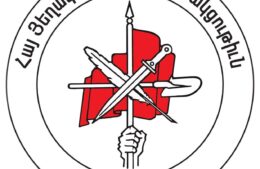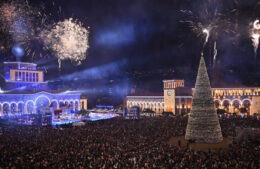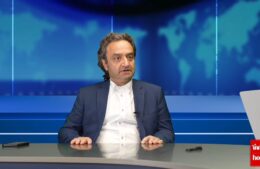EU-Commission in Austria Commemorates Armenian Genocide Centennial
- (0)
EU-Commission in Austria Commemorates Armenian Genocide Centennial –
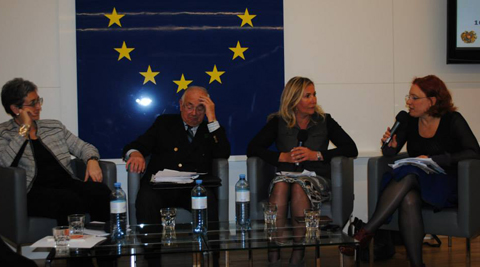
Vienna – On April 07, 2015 the House of European Union in Vienna, Austria was the venue for an outstanding event dedicated to the Centennial of Commemoration of Armenian Genocide 1915. The Armenian Community of Austria, the Austro-Armenian Genocide Commemoration Committee together with the Embassy of RA in Austria joined their efforts for the Genocide topic to be spoken out and discussed in the very centre of Europe. Discussed and taken to the level where historical facts lead to political actions and solutions. With the greatest support of Dr. Ulrike Lunacek, the vice president of the European Parliament, Brussels office, European Commission Representation in Austria and Austrian Green Party the plan became a reality in the Grand Hall of the EU Hause.
The title of the event speaks for itself – “Armenia – Catastrophe and Future, 100 Years between Death and Life”. The evening offered quite a diverse program including a roundtable discussion with a moderator, reciting and extracts reading and an exhibition of documents and photographs from the Genocide museum in Yerevan.
The welcome greeting was proudly announced by Dr. Arman Kirakossian, the Ambassador of the Republic of Armenia in Austria, permanent representative to the OSCE, UN and other international organizations in Vienna. As a historian and diplomat Dr. Kirakossian mainly stated that only learning lessons from the Past can provide us with save Future. Accepting historical truth, not falsifying or denying the facts should become the key lesson for humanity. Unfortunately, denial has taken deep roots in turkish society. However, many turkish intellectuals have started already the difficult road of transparency claiming that previous massacres should be openly exposed and accepted in order to prevent genocides in future.
At the end Dr. Kirakossian noted that denial and refusal of historical truth threatens the future safety of European continent and urged the international community to boost its efforts to prevent new crimes against humanity.
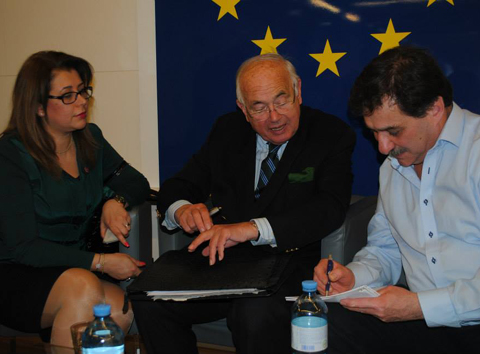
As a proof of joined efforts the Ambassador’s speech was followed by a round table discussion.
The panel consisted of Dr. Ulrike Lunacek, member and vice-president of the European Parliament, Dr. Heinrich Neisser, the second president of the National Council, professor at the Institute of political science, University Innsbruck Dr. Susanne Glass, ARD channel journalist, the president of the International journalists Association in Austria. Irene Suchy, Austrian 1st channel journalist participated as the panel moderator.
Irene Suchy structured her questions in a way that the panel members and
the audience went from Past to Future starting the discussion with explanation and definition of the symbol of the Genocide Centennial the forget-me-not flower.
Dr. Ulrike Lunacek underlined the remembrance element in the symbol. She stated that for a European person only remembering guarantees a safe and prosperous future. “I remember” part was carefully gathered and impressively exposed in the exhibition at the House of European Union. The MEP determined that the path to follow is not to forget the Past but look in the Future. Meetings, negotiations, education – all these means are considered completely acceptable and most welcome. As per Dr. Lunacek the “I demand” part is fully presented in the resolution recognizing and condemning the Armenian Genocide. The MEP has a great hope and determination that the resolution will be signed by European Parliament in Brussels on April 15, 2015 thus calling on Turkey to recognize and condemn the genocide committed by the Ottoman Empire as a basis for a future relationship along with international commitments and European aspirations.
Dr. Heinrich Neisser pointed out that we have to define the exact illness to find an effective cure for the patient. For historians it goes without saying that it was a genocide. Moreover, Armenian genocide is a part of European history, he stated. Now it’s the politicians turn to “cure the patient”, to clean up the conflict and bring it to the end.
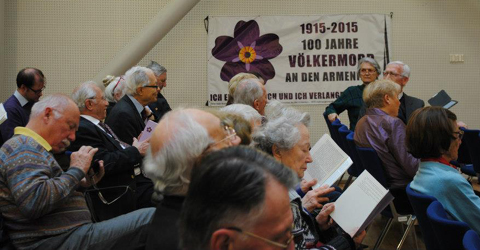
Dr. Susanne Glass mentioned the great role of Culture in that struggle. The thesis that Music can be strong was proven by the joint Israel-Palestinian orchestra, a very powerful and impressive example to follow for Armenia and Turkey. Touristic exchange can play a great role in opening up the land of Armenia. Economic connections will be considered as next step in overcoming the conflict. But at the end, Dr. Glass mentioned, it’s the job of politicians to come up with a political consensus. So we all have very high expectations for EP to sign the resolution on Centennial of Armenian Genocide.
The panel discussion ended up with the most touching word of Herbert Mauer, Armenian expert and translator who read extracts from his new book called “And God speaks Armenian”. From the political complexity to the simplicity of cultural cooperation – that’s H. Mauer’s formula for better world. Being in love with Armenian language Mauer describes it as a journey from man to man, a journey between yesterday and tomorrow heading to the future which has the greatest of all names – Freedom. Herbert Mauer defined his book as a tribute to Armenia, the land that nurtured ancient culture, the birthplace of cosmic alphabet and spiritual stones, a soil that puts its power in future generations. With his book H. Mauer expressed deep gratitude to the nation that has not only survived but also manages to live life to the fullest showing the world an unprecedented example of courage and dignity. And with a pure Armenian accent Herbert Mauer said:”Shnorhakalutjun!”
Seda Ter-Minasyan
journalist
